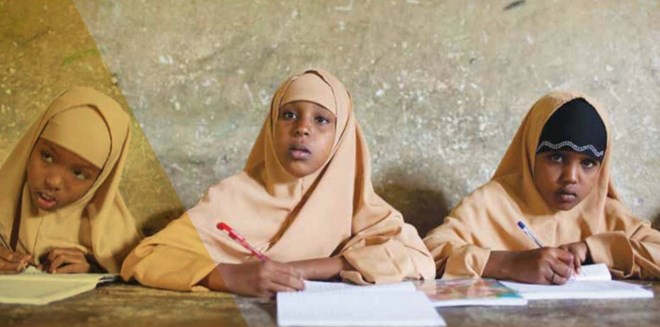

The Somalia Education Cluster Operational Framework 2018-2020 is the key guiding document for the Education Cluster work in the upcoming years.
It outlines the strategic directions, key approaches and activities and operational modalities in order to achieve the objectives. Through this, the Education Cluster Secretariat and Partners aim at an Education in Emergency (EiE) response that is effective, efficient, timely and support quality programmes and implementation, as well as a mechanism for advocacy, high level decision making, funding for EiE and support the gradual transition of coordination leadership to the Ministry of Education (MoE). The operational context is expected to be responding to the ongoing drought, as well as the ongoing conflict in country. However, the situation and context may change rapidly, and the operational framework is set out to strengthen the national and regional cluster, MoE staff and Education Cluster partners to respond with EiE activities based on needs.
The Operational Framework outlines the Education Cluster mandate and the governance structures in Somalia Education Cluster, with the aim to provide an overview of the existing workflows and decision-making bodies in the Cluster. Further, the Strategic objectives and key activities for the following three years are detailed under each core function for the education cluster, also including Accountability to Affected People as a seventh function.
The Operational Framework will support and guide the development of HRPs and Education Cluster Annual Work Plans for 2018-2020, and will be flexible for necessary revisions and adjustments according to the context and situation in Somalia.
To ensure the operational framework is implemented and progressing, it is accompanied by an Action and Monitoring Plan. Included in the plan is a quarterly review of the framework, which also gives the opportunity for any corrective measures for the EiE response.
The Operational Framework and the three Strategic Pillars
There are three pillars that guide the strategic direction of the Global Education Cluster, and therefore also serve as the backbone of this Framework.
The pillars are accountability, partnership and the humanitarian-development nexus.
Accountability is holding the Cluster leadership team accountable for ensuring the fulfillment of core cluster functions. The core cluster functions for the Cluster is outlined in this framework (below), and is monitored through quarterly reviews. Additionally, the Cluster Coordination Performance Monitoring (CCPM) will evaluate the cluster’s performance, including partner discussions and input, particularly for corrective measures and way forward. Monthly Cluster meetings will function as accountability measure as well, for updates from the Secretariat and information from the leadership.
The second pillar is Partnership. The Cluster is a collective and partnership is, therefore, the basis for all our work. This includes a partnership with the Ministry of Education (MoE) at the national and regional level, as well as other government authorities. The Government of Somalia is the ultimate duty bearer for providing children with access to education throughout emergencies. Through the partnership between the MoE and the Education Cluster, the aim is to support and strengthen the capacity of the MoE in fulfilling this responsibility. For the Secretariat, it is also important to have a close and strengthened collaboration and cooperation with the regional clusters to strengthen the ownership and sustainability of the response (see core function one, two and five below). Further, the partnership between the Secretariat and the partners is crucial for a strong cluster to function, and to fulfill the strategic objectives and the activities in the core functions for this Framework, as outlined in the next chapters.
Therefore, in the development of the Operational Framework, it has been imperative to include cluster partners. It is key for strengthening partnership, as well as ownership and joint responsibility, and to ensure that Cluster partners’ reality in the EiE response is taken into consideration in the development of the plans.
Pillar three is the Humanitarian Development nexus, with the objective of bridging humanitarian and development responses to advance resilience, reduce vulnerability and promote long term and sustainable development. Education is at the heart of this work, because in emergencies, education is lifesaving, providing children with a sense of normalcy in a protective space. Schools are a meeting point in the community and can serve as a hub for other services, particularly life-saving assistance, information and life skills for children and parents. Although Education in Emergencies may come with temporary solutions, education is not a short-term intervention, nor investment. By providing children and youth with continuous education, we are also supporting more long-term goals, and building stronger citizens for stronger nation-building. In Somalia, where the drought is expected to move into 2018, linking EiE programming with recovery and resilience is crucial. This will be more elaborated in core function five, as well as under strategic planning in core function three.
The work of the Education Cluster and the Education Cluster Partners is in addition, guided by the Humanitarian Principles of Humanity; Neutrality; Impartiality; and Operational Independence as well as the Do No Harm principle.
Source: Reliefweb
more recommended stories
 Kenya’s Unjustifiable Interference in Sudan: A Grave Violation of International Law and Regional Stability
Kenya’s Unjustifiable Interference in Sudan: A Grave Violation of International Law and Regional StabilityBy: Abdi Jama Kenya’s continued meddling.
 The Dire Need for Reunification of the Somaliland People: Addressing theDivisive Impact of the Kulmiye Government
The Dire Need for Reunification of the Somaliland People: Addressing theDivisive Impact of the Kulmiye GovernmentAbstractThe unity and solidarity of Somaliland.
 Somalia’s Southwest State opposes federal government’s plan to withdraw Ethiopian troops by 2024
Somalia’s Southwest State opposes federal government’s plan to withdraw Ethiopian troops by 2024The Southwest regional state administration has.
 President Hassan Sheikh, U.S Secretary of State Discuss Somalia’s Security Interests and Counterterrorism Efforts
President Hassan Sheikh, U.S Secretary of State Discuss Somalia’s Security Interests and Counterterrorism EffortsIn a diplomatic engagement, President Hassan.

